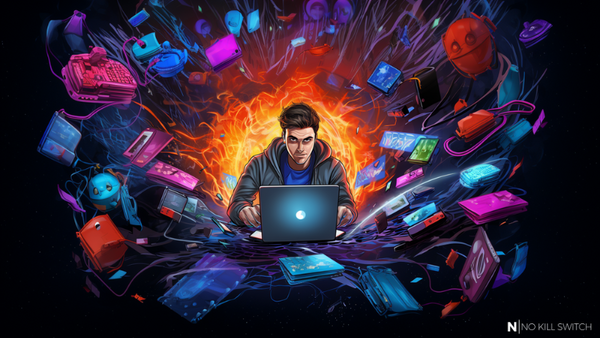The first article in the series can be found here. I've covered there how I started my journey (of getting rid of privacy-violating behavioral trackers & personalized ads) and what I've changed when it comes to news consumption & searching for information on the Internet. We'll continue from there.
"Core" online services
What's your set of core online services that you use every day? Call me a boomer, but in my case, it's still e-mail, calendar, message communication & maps. Sadly, all of these areas are already penetrated by companies that trade your privacy for convenience (e.g., access to "free" service). Needless to say, I was looking for providers who do not:
- Scan the content (of my mailbox/calendar/messages)
- Allow activity tracking for my activities (like tracking pixels)
- Overbloat their services/app with features I don't need (that can go over the board with intrusiveness)
It was relatively easy to find something suitable for messaging (Signal - star donation) & e-mail (Hey), but far more challenging for calendar ... So far, I've only replaced Google Calendar's "front-end" (with Cron (free)), but 37signals (creators of Hey) have promised to release their own calendar early 2024 - fingers crossed.
When it comes to maps - this battle is still ahead of me. But these days, I don't use maps (outside of Strava that I consider safe) often enough to categorize them as a high priority.
Creative/knowledge work
This one may be the most critical category of all. I do a lot of creative/knowledge work not only for my employer (where I'm limited to whatever's allowed by internal policies) but also privately - for self-development, curiosity, professional branding & numerous side-gigs. It typically involves writing (texts or code), diagramming, or visual sketching. Using tools that, from the legal standpoint, OWN my data (& can do anything with it) and only let me interact with them (as long as I pay a monthly fee) is not an option.
After doing some research, here are the ones I've found the safest (obviously, it's a matter of trust as there could be no 100% guarantee):
- Roam Research (Professional) for knowledge management
- reMarkable 2 for manual sketching/note-taking
- Miro (Consultant) for diagramming, presenting
- Grammarly (Premium) to help with writing & editing texts
While my trust in the first two options is profound & unshaken, the latter two are just the lesser evil - I haven't found anything undoubtfully better (safer) & in 95% of cases, I use them for assets that will end up published on the open Internet anyway.
Reading/listening to the content
What about consuming written/audio content (newsletters, read-it-later articles, podcasts)? The ad-based freemium model is definitely a reigning king here. To be frank - I'm still experimenting & a lot can change, but for now, I'm relying on the following set of tools:
- Matter (free) for asynchronous "read-it-later" inventory
- Snipd (Premium) for podcasts (mainly because of its AI features - super-convenient if you subscribe to many podcasts but are very picky on which episodes are worth your attention)
I am also trialing a very controversial (IMHO) app called Artifact (free, created by co-founders of Instagram) - which proposes a new way to traverse the Internet "news" content. Why controversial? Because all it does is pretty much profiling you and pushing the relevant content your way - which sounds exactly like the shit I'd like to avoid. So what's the catch here? Oh, that's very simple:
- Artifact works in an isolated "container" (think: custom browser), so it cannot access my "normal" web browsing. I use it mainly to check "what's new" (across the whole web) in those few categories I care for (e.g., books, technology). I trust it more than Google's recommendations.
- But of course, I don't control this "container" in the slightest, so there is no chance for ad-blocking add-ons: it's part of their value proposition (for content providers who sell ad space). Still, it's not the worst deal ever, as it helps me occasionally break my info bubble.
Gen AI tools
Should it even be a separate category? It seems that LLMs are taking the Internet by storm & it's hard to find any application w/o the Gen IA feature these days ... (e.g., both Miro & Grammarly - mentioned above - have AI capabilities). Frankly, I prefer to keep LLM usage "contained". For example, I could not imagine going for a knowledge management tool with Gen AI features (e.g., that automatically arranges - or worse - modifies what I've put in the tool). That is contrary to what I expect from such utilities.
At this point, I rely upon the following combo:
- ChatGPT (Plus)
- GH Copilot (Personal)
- Midjourney (Basic)
Why these particular three? These are very early days for Gen AI & I trust no LLM tools that I don't run locally (which is too resource-consuming). So, any pick is good/bad enough, as I ensure only to input there what I would not mind getting published on the Internet. In the early days of that unregulated space (AI), one has to assume that the absolutely worst case may happen.
To be (most likely) continued.





